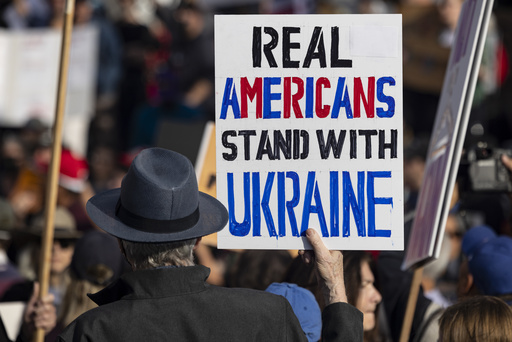KYIV, Ukraine — Just ahead of the third anniversary of Russia’s extensive invasion, the atmosphere in Ukraine remains grim and charged, reminiscent of the tense days preceding the onset of hostilities. However, the Ukrainian people are now facing a new anxiety from what was once considered their strongest ally — the United States. Support from the U.S. seems to be dwindling, as former President Donald Trump advances narratives that align closely with those of Russian President Vladimir Putin, promising to resolve the conflict between the two nations.
Throughout the prolonged conflict, initial solidarity among Ukrainians has started to fray as old grievances and political disputes resurface. Yet, following Trump’s recent misleading statements labeling Ukrainian President Volodymyr Zelenskyy a “dictator” for his decision to delay elections last year, even Zelenskyy’s fiercest detractors have begun to stand by him, leading to a renewed sense of unity.
“While he may not be perfect, calling him a dictator is unjust,” expressed Kateryna Karaush, a 25-year-old tech worker from Kyiv, who, like a majority of Ukrainians and some Republican members of Congress, is struggling to comprehend Trump’s pro-Russian stance — a notable shift in U.S. foreign policy. “It feels like the whole world is against us,” she added, summarizing the sentiment felt by many.
Despite overwhelming challenges, the Ukrainian forces, significantly supported by U.S. military aid, have successfully resisted Russian attempts to seize control of their nation, although approximately one-fifth is still under Russian occupation. The human toll has been catastrophic over the past three years, with countless civilians and soldiers killed or injured, tens of thousands unaccounted for, and millions displaced from their homes.
Recently, the somber mood intensified after Trump expressed intentions to swiftly end the hostilities in a manner perceived by Zelenskyy and numerous Western leaders as excessively favorable to Russia. The murmur of dissent grew stronger after Trump branded Zelenskyy a “dictator” and reports surfaced revealing U.S. and Russian officials convening in Saudi Arabia to discuss a potential ceasefire, excluding Ukrainian input. As a result, even those previously opposed to Zelenskyy found themselves defending him.
Yaroslav Zhelezniak, a lawmaker from the opposition party Holos, noted, “We may be divided on our opinions about Zelenskyy, but the decision to support him rests solely with the Ukrainian people. We have the right to critique him because ultimately, he is our elected leader.”
Trump’s accusations against Zelenskyy have faced backlash from both Democrats and some Republicans in Congress, where bipartisan backing for military support to Ukraine has been a cornerstone policy. Conversely, Vice President JD Vance criticized Zelenskyy for cautioning Trump against Russian propaganda.
As tensions escalated, a planned news conference following discussions between Zelenskyy and Trump’s Ukraine envoy concerning war cessation was abruptly canceled. A recent poll conducted from February 4 to February 9 by the Kyiv International Institute of Sociology indicated that public trust in Zelenskyy is at 57%, with responses taken from 1,000 residents across territories controlled by the Ukrainian government.
Larysa, a 52-year-old from Kharkiv who asked to keep her last name private due to security concerns, shared, “We have a president we support. During wartime, we remain united.” This political schism with the U.S. emerges amid increasing struggles faced by Ukrainian forces, who, despite being outnumbered and outgunned, bravely attempt to repel Russia’s gradual advancements.
From the front lines, some Ukrainian soldiers remain hopeful, voicing their determination to continue the fight despite potential shortages of weapons and resources. “Regardless of whether we have enough ammunition or funds, our obligation to defend our country remains unchanged,” stated an anonymous officer adhering to military decorum. “Lack of shells? We’ll resort to rifles. No rifles? We’ll pick up shovels.”
Trump’s recent remarks, which echoed a common narrative from Putin regarding the need for Zelenskyy to conduct elections, have found minimal support in Ukraine. Even among opposition members, there is recognition of Zelenskyy’s right to delay elections amid wartime conditions. Volodymyr Ariev, a member of the European Solidarity party, remarked, “Elections cannot occur until we have a clear understanding of a peace framework with Russia. Conducting them now would solely benefit the Kremlin, further dividiring Ukrainians and potentially leading to the selection of a president who would capitulate to Moscow.”
Zelenskyy’s advisor, Mykhailo Podolyak, highlighted additional concerns regarding the feasibility of elections, arguing that Russian interference could heavily disrupt any electoral process, which would already face immense obstacles. Millions of Ukrainians displaced abroad could find it exceedingly challenging to participate, along with many residents of Russian-occupied territories who would face insurmountable barriers to voting.
About 800,000 Ukrainians are actively engaged in the military, which complicates their ability to participate in elections without compromising defense efforts. “It would be catastrophic for Ukraine to hold elections before signing a peace agreement with solid security guarantees,” claimed Valerii Pekar, a professor at Kyiv-Mohyla Business School. “The current narrative pushed by both the U.S. and Russia advocating for ‘elections first, then peace’ is the quickest way to undermine Ukraine.”
